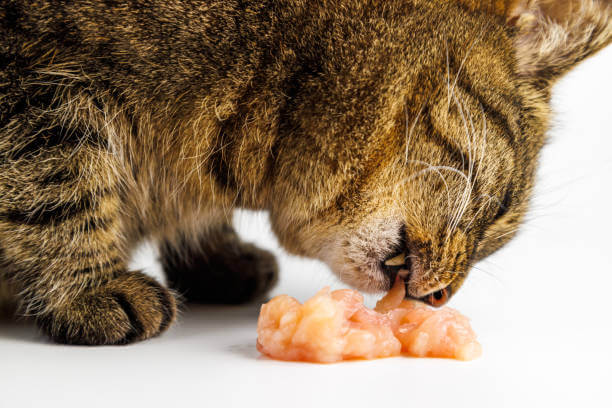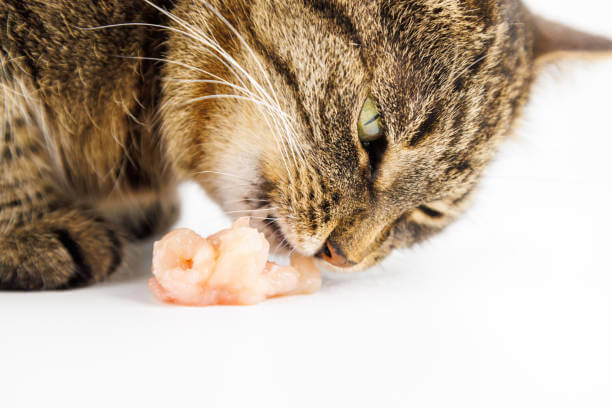Discover if feeding raw chicken to cats is safe or not. Can Cats Eat Raw Chicken?Understand the potential risks involved and learn about healthier alternatives. Get expert advice on feline nutrition and safe feeding practices. As cat owners, we want the best for our feline companions. The question of whether cats can eat raw chicken often comes up when discussing feline nutrition. Some people believe that feeding raw meat is closer to a cat’s natural diet, while others believe it poses too many health risks.

With the growing popularity of raw diets for pets, it’s natural to wonder if cats can safely consume raw chicken. In this blog post, we’ll explore the topic in-depth and provide valuable insights from experts, real-life case studies, and research findings.
Introduction to Can Cats Eat Raw Chicken?
Before we delve into the topic, let’s get some basics out of the way. Cats are carnivorous animals, meaning their natural diet consists mainly of meat. Their sharp teeth and powerful jaws are designed for catching and eating prey in the wild. This means that cats can eat raw chicken since it is a type of meat. However, it’s essential to understand that domestic cats have evolved to live alongside humans and do not necessarily require a wild, raw diet.
The Basis for Differing Opinions
As mentioned earlier, there are varying opinions on whether cats can eat raw chicken. Some believe that it is a healthier option because it mimics the diet of their wild ancestors. On the other hand, some argue that domestic cats have different nutritional needs and digestive systems compared to their wild counterparts. They claim that feeding raw meat can lead to serious health issues such as bacterial infections, nutritional imbalances, and even choking hazards from bones.
Raw Chicken Serving and Storage
If you decide to feed your cat raw chicken, there are a few factors you need to consider. Firstly, make sure the chicken is fresh and free of any additives or preservatives. Secondly, handle the meat with caution and proper hygiene practices to avoid contamination. Thirdly, ensure the chicken is served at room temperature as cold food can cause digestive issues for cats. Lastly, store any remaining raw chicken in the fridge or freezer to prevent spoilage and potential health risks. We recommend using airtight containers and separating the chicken from other foods to avoid cross-contamination.
Can Cats Eat Chicken Bones?
One of the most significant concerns with feeding cats raw chicken is the risk of bone ingestion. Cooked bones are known to be dangerous for cats as they can splinter and cause internal injuries. However, some argue that raw chicken bones are safe for cats since they are softer and easier to digest. Nevertheless, it’s essential to remember that every cat is different, and their digestive systems may not handle bones the same way. It’s always best to err on the side of caution and avoid feeding your cat chicken bones altogether.
Can Cats Eat Raw Chicken Liver?
Another common question is whether cats can eat raw chicken organs, specifically the liver. While it’s true that wild cats consume the entire prey, domestic cats may not require all the organ meat in their diet. Raw chicken liver can be beneficial for cats as it is a rich source of essential vitamins and minerals. However, too much liver consumption can lead to an imbalance in nutrients, causing health issues in the long run. As with any food, moderation is key. We recommend consulting with a veterinarian to determine the right amount of liver your cat should consume.

What about Other Chicken Organs?
Besides the liver, cats can eat other raw chicken organs such as the heart, gizzard, and kidneys. These organs are also high in essential nutrients and can be a healthy addition to your cat’s diet. However, it’s crucial to introduce new foods gradually and monitor your cat’s reaction. If you notice any signs of discomfort or digestive issues, stop feeding them that particular organ immediately. We also recommend consulting with a veterinarian before adding any new organ meat to your cat’s diet.
Transitioning Your Cat or Kitten to Raw Chicken
If you plan on transitioning your cat to a raw diet, it’s essential to do so gradually. Sudden changes in diet can lead to digestive issues and discomfort for cats. Start by mixing small amounts of raw chicken with your cat’s regular food and slowly increase the ratio over time. This will allow their digestive system to adjust and avoid any potential health risks.
Alternatives to Raw Chicken
If you’re unsure about feeding your cat raw chicken, there are plenty of healthier alternatives available. High-quality canned or dry cat food that is specifically formulated for feline nutrition is a safe and convenient option. You can also opt for cooked chicken, but make sure it is thoroughly cooked and free from any seasonings or additives that could be harmful to cats. The bottom line is that it’s essential to provide your cat with a balanced diet that meets their nutritional needs. The choice of whether to feed your cat raw chicken ultimately depends on their individual preferences and health requirements. It’s always best to consult with a veterinarian for professional advice on your cat’s diet.
Risks of Raw Chicken and Chicken Bones for Cats
While some cats may thrive on a raw chicken diet, it’s essential to be aware of the potential risks. Raw chicken can contain harmful bacteria such as Salmonella and E. coli, which can cause severe gastrointestinal issues in cats. Moreover, feeding your cat chicken bones increases the risk of choking, oral injuries, and digestive obstructions. If you choose to feed your cat raw chicken, make sure to take all necessary precautions and monitor their health closely.
Final Thoughts
In conclusion, while cats are indeed carnivorous animals and can eat raw chicken, it’s not a necessary or recommended part of their diet. Domestic cats have different nutritional needs and digestive systems compared to their wild counterparts, so it’s best to stick to high-quality cat food that is specifically formulated for feline nutrition. If you choose to feed your cat raw chicken, make sure to do so safely and in moderation. Always consult with a veterinarian for professional advice on your cat’s diet. So, it’s essential to be well-informed and make the best decision for your furry feline friend.
FAQS
Q: Can I feed my cat raw chicken every day?
A: While it’s possible to feed your cat raw chicken daily, it’s not recommended as it may lead to several health issues in the long run. It’s best to consult with a veterinarian for professional advice on your cat’s specific nutritional needs.
Q: Is it safe for cats to eat raw chicken bones?
A: No, it’s not safe for cats to eat raw chicken bones as they can splinter and cause internal injuries. It’s best to avoid feeding your cat bones altogether and opt for boneless meat or high-quality cat food.
Q: Can I give my kitten raw chicken?
A: It’s not recommended to feed kittens raw chicken as their immune systems are still developing, and they may not handle raw meat well. It’s best to consult with a veterinarian for specific recommendations on your kitten’s diet.
Q: What are some signs that my cat is having digestive issues from eating raw chicken?
A: Some common signs of digestive issues in cats include vomiting, diarrhea, bloating, and decreased appetite. If you notice any of these symptoms after feeding your cat raw chicken, stop immediately and consult with a veterinarian.
Q: Are there any safer alternatives to raw chicken for cats?
A: Yes, there are plenty of healthier alternatives available such as high-quality canned or dry cat food specifically formulated for feline nutrition. Cooked chicken can also be an alternative, but make sure it is thoroughly cooked and free from any seasonings or additives that could be harmful to cats.
Conclusion
Feeding cats raw chicken is a topic that sparks debate among pet owners and experts alike. While some cats may thrive on a balanced raw diet, it’s essential to consider the potential risks, nutritional requirements, and safe handling practices. If you’re interested in exploring raw feeding, consult with a veterinary professional to ensure the health and well-being of your feline companion.
Remember, the ultimate goal is to provide our cats with a diet that meets their nutritional needs while prioritizing their safety and long-term health. By staying informed and making responsible choices, we can provide the best care for our beloved feline friends.
